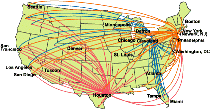United States Department of Transportation

United States Department of Transportation: Publications
Date of this Version
2002
Abstract
Five years have passed since the 1996 International Workshop on Human Factors in Offshore Operations. Over this period, we learned that the level of knowledge of human factors has increased dramatically. We also made significant advances in applying human factors disciplines more effectively within an organization. In order to invest the necessary resources, technical specialists, engineers and corporate leaders need to be confident that the human factors tools they choose to implement will meet the desired goals.
To this end, the 2002 International Workshop on Human Factors in Offshore Operations (HFW2002) brought together six key work groups to help those who wish to develop more effective human factors measures to reduce risk, improve safety and production performance. Each group was successful in developing a set of guidelines, tools and references that are invaluable to those active in the design of new facilities, maintaining the integrity of existing facilities, managing the workforce, conducting incident investigations, developing, implementing and controlling health, safety and environmental (HSE) management systems and managing behavioral processes. The applications and tools discussed by each working group during the course of the workshop documented practical approaches for applying human factors techniques in many areas. These reflect state-of-the-art practices within industry.
The supportive remarks, keynote addresses and theme papers presented by government leaders, representatives from regulatory and certification agencies, and management of several international oil companies clearly demonstrated the importance of applying human factors.
All six (6) working groups enjoyed a balanced number of representatives from industry, government and institutions who pro-actively discussed applications related to each topic of discussion. Exchange of information and points of discussion were based upon state of the art white papers written by working group leaders and co-chairs in attendance and submitted to each participant at the opening of the workshop. From the beginning of deliberations, each white paper was enhanced by the participants to capture the true essence of each topic and clearly established a roadmap for the practical application of human factors in the life cycle of an offshore facility.
The purpose of HFW2002 was to provide practical applications and economical solutions to effectively establish and implement human factors as accepted practice vs. an add-on to existing practice. The workshop was successful in providing tools, references and guidelines to more effectively integrate human factors into six key areas targeted by the workshop to improve safety performance and reduce risk:
· Incident Investigation
· Design of New Systems
· Design of Existing Systems
· Operations / Work Force
· Management System Practices and Policies
· Behavior Processes
It is up to Industry to develop its own specification(s) of acceptable performance with input from peers, regulatory agencies, certification bodies, institutes and specialists to reduce risk and improve safety performance. This workshop brought together representatives of all of these organizations from different corners of the world to work together toward this common goal. The application of integrating human factors can be overwhelming without going through a long learning curve and being exposed to expensive time consuming lessons. With the aid of information developed by the HFW2002 Chairs, Co-Chairs and many participants, organizations have started to acquire the fundamental knowledge needed to integrate human factors in the lifecycle of offshore operations. What is now needed is for these organizations to start, or those that have already started, to continue, to apply the knowledge from the Workshop in their day-to-day design and operations. There is no single war to be won to improve human factors and safety; it is a never ending battle, seeking to continuously improve the safety performance.
At the conclusion of the workshop one key point was clear: ignoring human factors will result in an increase not a decrease in incidents, lower safety performance and increased costs. Human factors are paramount to all aspects of offshore operations and essential in reducing human performancerelated risks.


Comments
Proceedings of the 2nd International Workshop On Human Factors In Offshore Operations '02. Huston, Texas, April 8-10, 2002.